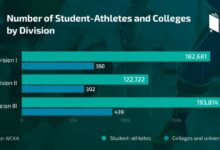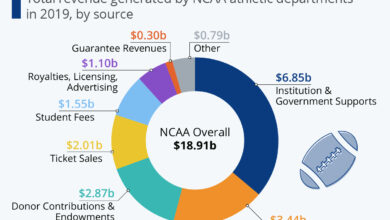Scholarships For Student Athletes: Key Information And Insights
Scholarships for student athletes play a crucial role in shaping their academic and athletic careers, providing opportunities for growth and success. Let’s delve into the essential aspects of these scholarships and how they impact student athletes.
Enhancing Communication Skills in the Workplace
Effective communication in a professional setting is crucial for the success of individuals and teams. It involves clear, concise, and respectful interactions that help in conveying information accurately and building strong relationships with colleagues.
Key Components of Effective Communication
- Clarity: Ensuring that your message is easily understood by using simple language and avoiding jargon.
- Conciseness: Communicating your point in a direct and to-the-point manner without unnecessary details.
- Respect: Acknowledging the perspectives and opinions of others while maintaining a professional tone.
- Feedback: Providing and receiving feedback constructively to improve communication and performance.
Verbal and Non-verbal Communication Techniques
- Verbal: Using active listening, asking clarifying questions, and summarizing key points during conversations.
- Non-verbal: Maintaining eye contact, using open body language, and being aware of facial expressions and gestures to enhance understanding.
Active Listening and Team Communication
Active listening involves fully concentrating, understanding, responding, and remembering what is being said. It contributes to effective team communication by fostering trust, empathy, and collaboration among team members.
Role of Feedback and Positive Work Environment
Feedback plays a vital role in enhancing communication skills by providing insights into areas for improvement and reinforcing positive behaviors. It fosters a supportive work environment where employees feel valued and motivated to contribute their best.
Handling Conflicts Through Effective Communication Strategies
- Addressing issues promptly and directly to prevent escalation.
- Active listening to understand the perspectives of all parties involved.
- Seeking common ground and finding mutually beneficial solutions through open communication.
Eligibility Criteria for Scholarships
To qualify for scholarships as a student athlete, there are several common eligibility requirements that need to be met. These criteria typically encompass a combination of academic performance, athletic achievements, and sometimes additional factors such as community service or leadership roles.
Academic Performance and Athletic Achievements
In order to be eligible for scholarships, student athletes often need to maintain a certain grade point average (GPA) to demonstrate their academic prowess. Academic performance plays a crucial role in determining scholarship eligibility as it reflects the student’s commitment to their education. On the other hand, athletic achievements, such as participation in varsity sports teams or winning championships, also weigh heavily in the selection process. The ability to excel both academically and athletically is a key factor in determining eligibility for scholarships.
Additional Criteria
Apart from academic and athletic performance, some scholarships may also consider other criteria such as community service and leadership roles. Involvement in community service activities showcases a student athlete’s dedication to making a positive impact beyond the sports field. Similarly, holding leadership roles within school clubs or sports teams demonstrates qualities such as teamwork, responsibility, and initiative, which are highly valued by scholarship committees. These additional criteria help assess the overall character and potential of student athletes, influencing their eligibility for scholarships.
Application Process for Scholarships
As a student athlete, applying for scholarships can be a crucial step towards achieving your academic and athletic goals. The application process typically involves several key steps that need to be followed diligently to increase your chances of receiving financial aid.
Steps in Applying for Scholarships
- Research and Identify Scholarships: Begin by researching scholarship opportunities specifically designed for student athletes. Look for scholarships that align with your academic interests and athletic achievements.
- Prepare Necessary Documents: Gather all required documents, including academic transcripts, sports performance records, recommendation letters, and personal statements.
- Complete Application Forms: Fill out scholarship application forms accurately and ensure all information provided is up to date and relevant.
- Submit Applications on Time: Be mindful of scholarship deadlines and submit your applications well before the due date to avoid missing out on opportunities.
- Follow Up: Stay proactive and follow up on your scholarship applications to ensure that all documents have been received and processed.
Tips for Enhancing Scholarship Applications
- Highlight Academic and Athletic Achievements: Emphasize your academic performance and sports achievements in your application to showcase your dedication and skills.
- Secure Strong Recommendation Letters: Request recommendation letters from coaches, teachers, or mentors who can attest to your character and abilities.
- Craft a Compelling Personal Statement: Write a persuasive personal statement that highlights your passion for your sport, academic goals, and future aspirations.
- Engage in Community Service and Extracurricular Activities: Participate in community service projects and extracurricular activities to demonstrate your well-rounded personality and commitment to serving others.
Importance of Recommendation Letters and Personal Statements
Recommendation letters and personal statements play a crucial role in the scholarship application process as they provide insights into your character, abilities, and potential for success. These documents offer a glimpse into your personality beyond academic and athletic achievements, giving scholarship committees a holistic view of who you are as a student athlete.
Significance of Academic Achievements and Sports Performance Records
Academic achievements and sports performance records are essential components of scholarship applications. These records demonstrate your commitment to excellence, discipline, and hard work, which are qualities that scholarship providers look for in potential recipients. Make sure to highlight your accomplishments in both academics and sports to strengthen your application.
Role of Community Service and Extracurricular Activities
Engaging in community service and participating in extracurricular activities can set you apart as a well-rounded student athlete. Scholarship committees value candidates who demonstrate a commitment to giving back to their communities and who show active involvement in activities outside of academics and sports. Including these experiences in your application can enhance your overall profile and increase your chances of receiving scholarships.
Timeline for Scholarship Applications
When applying for scholarships, it is crucial to adhere to deadlines and stay organized throughout the process. Be aware of key dates for scholarship applications, submission deadlines, and any additional requirements that need to be fulfilled. Keeping track of these timelines will help you submit your applications on time and maximize your chances of securing financial aid.
Successful Scholarship Application Essays from Student Athletes
To provide you with a reference point, here are examples of successful scholarship application essays from student athletes who effectively conveyed their passion, dedication, and aspirations in their writings:
– [Example 1]
– [Example 2]
NCAA Scholarships for Student Athletes
The NCAA plays a crucial role in providing scholarships for student athletes, ensuring that they can pursue their academic and athletic goals simultaneously. These scholarships help student athletes cover the costs of their education while representing their schools in various sports programs.
Regulations and Guidelines for NCAA Scholarships
- The NCAA has specific regulations in place to govern the awarding of scholarships to student athletes. These regulations aim to maintain fairness and uphold the amateur status of athletes.
- Student athletes must meet academic eligibility requirements to be considered for NCAA scholarships, ensuring that they prioritize their studies alongside their athletic commitments.
- The NCAA also sets limits on the number of scholarships that schools can offer in each sport, preventing any single program from gaining an unfair advantage through excessive scholarship funding.
Comparison with Other Scholarship Opportunities
- While the NCAA scholarships are focused on student athletes participating in collegiate sports programs, there are other scholarship opportunities available from private organizations, foundations, and sports associations.
- Compared to other scholarship options, NCAA scholarships are unique in that they are specifically tailored to support student athletes within the collegiate sports system, providing them with the necessary financial aid to pursue their athletic careers.
- Other scholarship opportunities may have different eligibility criteria and application processes, offering student athletes a variety of options to secure funding for their education and athletic pursuits.
Division I, II, and III Scholarships
Scholarships for student athletes vary across Division I, II, and III colleges, each with its own set of eligibility requirements and benefits. Let’s delve into the specifics of each division.
Division I Scholarships
Division I colleges are known for offering full-ride scholarships to student athletes, covering tuition, room and board, and other expenses. These scholarships are highly competitive and usually reserved for top-tier athletes with exceptional skills and performance records.
Division II Scholarships
Division II colleges also provide scholarships to student athletes, but they may not cover all expenses like Division I scholarships. These scholarships are often partial, offering financial aid for tuition or other specific costs. Eligibility requirements are slightly less stringent compared to Division I.
Division III Scholarships
Unlike Division I and II, Division III colleges do not offer athletic scholarships. However, student athletes can still receive academic scholarships or financial aid based on need. Division III focuses on the balance between academics and athletics, prioritizing the student’s overall experience.
Benefits and Limitations
– Division I scholarships offer the most comprehensive coverage but come with intense competition.
– Division II scholarships provide financial assistance but may not cover all expenses.
– Division III colleges emphasize a well-rounded student experience but do not offer athletic scholarships.
Average Scholarship Amounts
– Division I colleges typically offer full-ride scholarships, which can amount to tens of thousands of dollars per year.
– Division II scholarships vary in amount, with some covering tuition partially or fully.
– Division III colleges do not offer athletic scholarships, focusing on academic and need-based aid.
Notable Colleges
– Division I: University of Alabama, University of Notre Dame, University of Florida
– Division II: Grand Valley State University, California State University, Queens College
– Division III: Williams College, Amherst College, Middlebury College
Scholarships for Different Sports
When it comes to scholarships for student athletes, there are opportunities available for various sports such as basketball, football, soccer, and more. Each sport may have specific scholarships tailored to the needs and requirements of that particular athletic discipline.
Basketball Scholarships
Basketball scholarships are often highly competitive, as the sport is popular and attracts a large pool of talented athletes. Criteria for basketball scholarships may include factors such as skill level, academic performance, and potential for contribution to the team.
Football Scholarships
Football scholarships are among the most sought-after in college athletics due to the popularity of the sport. Criteria for football scholarships may include performance on the field, physical attributes, leadership skills, and academic achievement.
Soccer Scholarships
Soccer scholarships are also widely available, particularly for female athletes. Criteria for soccer scholarships may include technical skills, tactical understanding, teamwork, and overall athleticism.
General Considerations
– Scholarships for different sports can vary in terms of availability and competitiveness.
– It is important for student athletes to research and identify specific scholarships that align with their athletic abilities and academic goals.
Impact of Scholarships on Student Athletes
Receiving scholarships can have a significant impact on student athletes, not only in terms of financial support but also in shaping their educational and career paths. Let’s delve into how scholarships influence the lives of student athletes.
Financial Burden and Educational Opportunities
Scholarships play a crucial role in alleviating the financial burden on student athletes and their families. By covering tuition fees, accommodation, and other expenses, scholarships enable student athletes to focus on their academics and sports without worrying about financial constraints. This financial support opens up opportunities for student athletes to pursue higher education and excel in their chosen field of study.
Role in Shaping Career Paths
Scholarships can act as a stepping stone for student athletes to pursue their career aspirations. By providing access to quality education and training, scholarships enable student athletes to develop their skills and expertise in their respective sports. This, in turn, can open doors to professional opportunities in the sports industry, coaching, or related fields. Scholarships help student athletes build a strong foundation for their future careers.
Long-Term Benefits
Receiving scholarships can have long-term benefits for student athletes beyond their academic and sports pursuits. Scholarships not only support student athletes during their college years but also contribute to their personal and professional growth. The discipline, resilience, and teamwork skills gained through sports and education can benefit student athletes in their future endeavors, helping them succeed in various aspects of life. Overall, scholarships provide a solid foundation for student athletes to thrive and reach their full potential.
Scholarships vs. Financial Aid
When it comes to funding higher education, students often have the option of scholarships or financial aid. While both can help alleviate the financial burden of college, there are key differences between the two in terms of eligibility criteria, application processes, and award amounts.
Types of Scholarships Available
- Academic Scholarships: Awarded based on academic achievement such as GPA, standardized test scores, and class rank.
- Athletic Scholarships: Given to student athletes for their performance in a particular sport.
- Merit-based Scholarships: Awarded for outstanding achievements in various fields like community service, leadership, or the arts.
Financial Aid Packages
Financial aid packages can include grants, loans, and work-study opportunities. Grants are typically need-based and do not require repayment. Loans need to be paid back with interest, while work-study allows students to work part-time to earn money for educational expenses.
Comparison Table: Scholarships vs. Financial Aid
| Criteria | Scholarships | Financial Aid |
|---|---|---|
| Repayment Requirements | No repayment needed | Loans require repayment |
| Long-term Financial Implications | Can reduce overall debt | Loans can lead to increased debt |
| Impact on Career Opportunities | Can enhance opportunities through recognition | No direct impact on career opportunities |
Considerations for Choosing between Scholarships and Financial Aid
When deciding between scholarships and financial aid, students should consider their individual circumstances, academic goals, and financial needs. It’s essential to weigh the pros and cons of each option to make an informed decision that aligns with their long-term educational and career aspirations.
Scholarships and Athletic Performance
Scholarships tailored for student athletes play a crucial role in shaping their academic performance and overall experience in college. These scholarships not only provide financial support but also impact various aspects of a student athlete’s life.
Impact on Academic Performance
Scholarships designed for student athletes can positively influence their academic performance. With the financial burden lifted, student athletes can focus more on their studies without the added stress of paying for tuition, books, and other expenses.
Promoting a Healthy Balance
Scholarships help in promoting a healthy balance between sports and education for student athletes. By providing financial aid, scholarships allow student athletes to allocate time for both their athletic commitments and academic responsibilities, leading to a more balanced college experience.
Long-term Career Opportunities
The long-term effects of scholarships on the career opportunities of student athletes after graduation are significant. Scholarships can open doors to professional sports opportunities, coaching positions, or other career paths related to their sport. Additionally, the discipline and teamwork skills developed through sports can be beneficial in various professional fields.
Building Community and Teamwork
Scholarships contribute to building a strong sense of community and teamwork among student athletes. Being part of a team supported by scholarships fosters a sense of camaraderie and unity, creating a supportive environment that encourages collaboration and mutual growth among student athletes.
Challenges Faced by Student Athletes in Securing Scholarships
Student athletes encounter various obstacles during the scholarship application process that can hinder their chances of securing scholarships. Factors like injuries, academic struggles, lack of exposure, competition from other student athletes, and the balance between sports training and academic performance can all impact scholarship opportunities. However, there are strategies that student athletes can implement to overcome these challenges and increase their likelihood of receiving scholarships.
Overcoming Obstacles in the Scholarship Application Process
- Seek academic support to address any struggles and maintain eligibility requirements.
- Stay proactive in seeking exposure through sports events, showcases, and recruitment platforms.
- Focus on injury prevention and proper rehabilitation to minimize the impact on athletic performance.
Importance of Recommendation Letters and Extracurricular Activities
- Request strong recommendation letters from coaches, teachers, or mentors to strengthen the application.
- Showcase leadership skills and involvement in extracurricular activities to demonstrate well-roundedness.
Utilizing Social Media and Networking
- Engage with potential scholarship providers on social media platforms to increase visibility.
- Attend networking events, sports camps, or showcases to connect with coaches and recruiters.
Tailoring the Scholarship Application Process for Different Sports
- Understand the specific requirements and expectations for scholarships in different sports.
- Highlight relevant skills and achievements that align with the criteria of each sport.
Successful Cases of Student Athletes Overcoming Challenges
- Provide examples of student athletes who excelled academically and athletically to secure scholarships despite obstacles.
- Showcase individuals who effectively balanced sports training, academics, and extracurricular activities to stand out in the application process.
Title IX and Scholarships for Female Student Athletes
Title IX, a federal law passed in 1972, has played a crucial role in promoting gender equality in sports scholarships. The law prohibits sex discrimination in educational programs and activities, including athletics, and has significantly impacted the availability of scholarships for female student athletes.
Impact of Title IX
Since the implementation of Title IX, there has been a noticeable increase in the number of scholarships available to female student athletes. Colleges and universities are now required to offer equal opportunities for both male and female athletes, leading to a more level playing field in terms of scholarship availability.
- Before Title IX, female student athletes had limited access to scholarships compared to their male counterparts. The law has helped bridge this gap and ensure that female athletes have the same opportunities to pursue their athletic and academic goals.
- By promoting gender equality in sports scholarships, Title IX has empowered female student athletes to excel in their chosen sports and receive recognition for their achievements on par with male athletes.
- Colleges and universities are now held accountable for providing fair and equitable scholarship opportunities to both male and female student athletes, fostering a more inclusive and diverse athletic environment.
Progress in Equal Scholarship Opportunities
Over the years, significant progress has been made in providing equal scholarship opportunities for male and female student athletes. While challenges still exist, the impact of Title IX has been instrumental in advancing gender equality in sports scholarships.
“Title IX has not only opened doors for female student athletes but has also paved the way for a more inclusive and diverse athletic landscape.”
Scholarships and College Recruitment
When it comes to college recruitment for student athletes, scholarships play a crucial role in attracting and securing talented individuals to colleges and universities. These scholarships serve as a powerful incentive for student athletes to consider specific institutions for their academic and athletic pursuits.
Role of Scholarships in College Recruitment
Scholarships act as a key factor in the college recruitment process for student athletes. Colleges and universities offer athletic scholarships to entice talented individuals to join their sports teams, contributing to the overall success and competitiveness of their athletic programs. These scholarships provide financial support for student athletes, helping them pursue their education while participating in sports at a high level.
- Athletic scholarships help colleges recruit top-tier athletes who can enhance the overall performance of their sports teams.
- These scholarships can cover tuition, fees, room and board, and other expenses, making college more accessible for student athletes.
- By offering scholarships, colleges demonstrate their commitment to supporting student athletes both academically and athletically.
Impact of Scholarships on Decision-making Process
Scholarships heavily influence the decision-making process for student athletes when choosing a college. The financial assistance provided through scholarships can often be a deciding factor for student athletes weighing their options.
- Student athletes consider the scholarship offers they receive as they evaluate different colleges and universities.
- Scholarships can sway student athletes towards institutions that not only offer strong athletic programs but also provide financial support to help them pursue their academic goals.
- A generous scholarship package can make a significant difference in a student athlete’s final decision on where to attend college.
Scholarships and Academic Success
When it comes to student athletes, balancing athletic commitments with academic responsibilities can be challenging. Scholarships play a crucial role in helping student athletes manage these competing demands, allowing them to focus on excelling both on the field and in the classroom. Let’s delve into how scholarships can impact the academic success of student athletes and set them up for long-term educational and career achievements.
Supporting Academic Performance
Scholarships provide student athletes with financial support that can alleviate the pressure of balancing sports and academics. With the financial burden lifted, student athletes can invest more time and effort into their studies, leading to improved academic performance. This support can also enable student athletes to access additional academic resources, such as tutoring services or study materials, further enhancing their educational outcomes.
- Scholarships can incentivize student athletes to maintain a certain GPA to remain eligible, promoting academic excellence.
- Financial stability from scholarships can reduce stress levels, allowing student athletes to focus better on their coursework.
- Access to academic support services through scholarships can enhance learning opportunities and facilitate academic success.
Long-Term Effects on Educational Attainment
The impact of scholarships on student athletes extends beyond their college years. By supporting academic success during their athletic careers, scholarships pave the way for higher educational attainment. Student athletes who excel academically while on scholarships are better positioned to pursue advanced degrees or enter competitive job markets post-graduation, enhancing their career prospects significantly.
Scholarships not only provide financial aid but also serve as a catalyst for academic achievement, setting student athletes on a path towards long-term success.
Analyzing the Impact of Artificial Intelligence on Customer Service
Artificial Intelligence (AI) is revolutionizing the way customer service is delivered, offering a range of benefits and challenges for businesses and consumers alike. By automating processes, analyzing data in real-time, and providing personalized interactions, AI has the potential to transform customer service experiences significantly.
Role of Artificial Intelligence in Transforming Customer Service Experiences
AI plays a crucial role in transforming customer service experiences by enabling businesses to offer faster response times, round-the-clock support, and personalized interactions. AI-powered chatbots and virtual assistants can handle routine queries efficiently, freeing up human agents to focus on more complex issues. This not only enhances the overall customer support experience but also increases operational efficiency.
Effectiveness of AI-Powered Tools in Enhancing Customer Support and Satisfaction
AI-powered tools have proven to be highly effective in enhancing customer support and satisfaction. By leveraging machine learning algorithms, businesses can analyze customer data to anticipate needs, personalize recommendations, and provide proactive support. This level of personalization can lead to increased customer loyalty, higher satisfaction rates, and ultimately, improved business outcomes.
Ethical Considerations Associated with the Use of AI in Customer Service Interactions
While AI offers numerous benefits for customer service, there are ethical considerations that must be taken into account. Issues such as data privacy, transparency in AI decision-making, and the potential for bias in algorithms need to be carefully addressed. Businesses must ensure that AI is used responsibly and ethically to maintain trust with customers and uphold standards of fairness in customer interactions.
Wrap-Up
In conclusion, scholarships for student athletes are not just about financial aid but also about fostering talent, dedication, and community within the sports world. These scholarships pave the way for bright futures and promising careers for student athletes.









